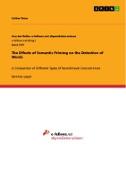The Effects of Semantic Priming on the Detection of Words
BücherAngebote / Angebote:
Seminar paper from the year 2019 in the subject Psychology - Cognition, grade: 1, 3, University of Wuppertal, language: English, abstract: In order to retrieve information more efficiently and quickly, our central nervous system makes use of implicit preactivation of associative neural networks. In this study, 78 participants were instructed to identify a sequence of word pairs consisting of either German words, nonwords or pseudowords within a lexical decision task. The procedure was carried out under three different conditions: a) no associations within a word pair, b) connection through general second-level cooccurrences, and c) connection through lemmatized second-level cooccurrences. The analysis of variance revealed highly significant differences in reaction time and error rate between lemmatized second-level cooccurrence compared to general second-level cooccurrences. Both, error rate and reaction time, were lower for lemmatized second-level cooccurrences. Stimuli consisting of words with second-level association had a positive effect on the reaction time and error rate. This could be proven due to a stimulus onset asynchrony of 50ms, avoiding semantical competition that could cause inhibitory effects on the reaction time. Linear regression also revealed that lemmatized second-level cooccurrences had a greater influence on the reaction time up to the target and the error rate compared to general second-level cooccurrences. This information could be used to improve models that explain the process of word recognition by adding the influence of the lemmatized second-level cooccurrence.
Folgt in ca. 10 Arbeitstagen
